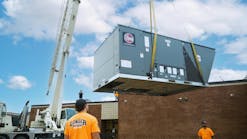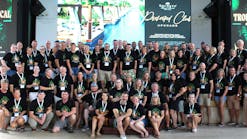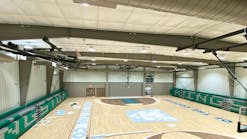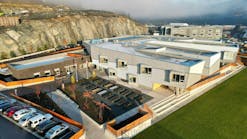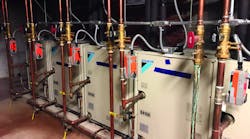WASHINGTON, D.C., February 22, 2019 — An innovative HVAC solution was the headliner for a special event February 19 at a 121-year-old building in the nation’s capital named after one of America’s greatest composer-musicians.
The event at Duke Ellington School of the Arts demonstrated how stepping beyond traditional non-inverter HVAC systems can preserve a building’s historical architecture, enhance energy efficiencies, minimize noise and earn design-award accolades.
A hands-on tour of the school hosted by Havtech, LLC– a Columbia, Maryland HVAC manufacturer’s representative for Daikin North America LLC – drew architects, designers, HVAC contractors and others to see firsthand how a Daikin VRVwater-cooled system allowed the school to integrate 165,000 square feet of new construction seamlessly onto its original historic building.
Daikin systems were able to provide the school with flexibility for future expansion, increased energy efficiencies and state-of-the-art indoor comfort.
Listed on the National Register of Historic Places, the Duke Ellington School of the Arts is an internationally renowned DC Public School, drawing students worldwide. When the school needed to expand dramatically, it called on Havtech to find an HVAC solution that minimized damage and/or reconstruction of the existing historical structure. All while creating a comfortable environment conducive to learning.
Dramatically increasing the school’s footprint into a 265,000 square-foot facility demanded attention to operational efficiencies. Further, Havtech had to consider sound levels from mechanical equipment that might impact the school’s performing arts facility, which is leased for local community and business events.
Havtech’s answer was to go ductless – an approach that minimizes penetrations into existing structures. Havtech and mechanical contractor Shapiro & Duncan, along with Global Engineering Solutions, proposed a Daikin water source VRV heat recovery system that allows customized zoning based on occupant demand.
“The consulting engineer and the mechanical contractor worked diligently to optimize this building’s total lifecycle costs, by both leveraging Daikin’s water-cooledVRVcapability and functionality, as well as by reducing the maintenance and increasing efficiency that the school will see for many years to come,” explained Tim Dorman, Sales Engineer for Havtech.
Unoccupied spaces in large facilities waste water and electricity. The new system’s zoning advantages opened up a creative opportunity to shift building load and concentrate heating/cooling demand. Ascheduling feature in Daikin’s Navigation™control system can regulate water and electricity consumption by zone, while offering simultaneous heating and cooling.
Now the school is able to shift load demands by moving students from one section of the facility to the next during the day. The result is twofold: enhanced building efficiencies and the ability to address teacher and student comfort needs.
Daikin round flow cassettes are installed in 264 zones, positioned and programmed to operate during custom schedules within three main zones.
The 360-degree round flow sensing cassettes feature low sound levels (27 dBA on low fan mode) – important for a performing arts school. Built-in intelligent eye sensors detect occupants in each space and direct airflow accordingly reducing the cold or hot draft feeling, while maintaining the same floor-to-ceiling temperature. This greatly reduces the common problem of hot or cold spots within the zone, and time consuming “comfort calls” to the maintenance staff.
The cassettes’ self-cleaning capability further reduces maintenance time. A default setting triggers a robotic arm to brush dust off the filter nightly, depositing dust particles into an interior holding canister. When it’s full, an indicator light goes on. To clean the canister, a vacuum hose is inserted in an easy-to-reach location on the cassette’s exterior, and within seconds the canister can be emptied.
“The expertise of Havtech and Shapiro & Duncan utilized through Daikin’s advanced product offering gives this unique school a superior comfort system that will benefit the institution for years to come,” says Chris Bellshaw, Vice President of VRVProduct Marketing at Daikin. “It’s a comfort solution that goes above and beyond what a traditional non-inverter system could offer. From aesthetics to zone control and sound levels to efficiency, the Duke Ellington School of Arts now has a budget-friendly heating and cooling system that fits the facility’s prominence.”
During the Havtech event at Duke Ellington, attendees explored the Daikin VRVsystem that helped the school earn a LEED Gold certification, along with “Best K-12 Education Project” award from Engineering News-Record and a “First Award,” an international architecture design award for non-residential buildings.
To learn more, download the Duke Ellington Blueprint below.
